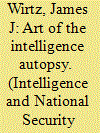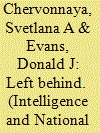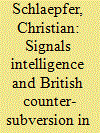| Srl | Item |
| 1 |
ID:
127712


|
|
|
|
|
| Publication |
2014.
|
| Summary/Abstract |
Although intelligence postmortems are a common practice in the aftermath of intelligence failure, little is known about how they are conducted. This article explores the methodology employed by Robert Jervis in intelligence postmortems that followed the fall of the Shah of Iran in 1979 and the formulation of the 2002 Iraq national intelligence estimate that warned of the possibility that Iraq had restarted its nuclear program. The analysis reveals the challenges faced by scholars as they attempt to assess why analysts failed to offer accurate estimates and the way contemporary international relations theory can be applied to the realm of policy. The findings of the postmortems also shed light on areas where additional collaboration among scholars and analysts can advance the art of intelligence analysis.
|
|
|
|
|
|
|
|
|
|
|
|
|
|
|
|
| 2 |
ID:
127716


|
|
|
|
|
| Publication |
2014.
|
| Summary/Abstract |
In the debate on intelligence contracting, intelligence officers are grouped into two personnel categories characterized by opposing sets of motivations and interests. Government employees are assumed to be motivated by a higher goal related to national security, while intelligence contractors are said to be motivated primarily by pecuniary interests and loyal first and foremost to their shareholders. Contemporary research on human motivation, however, suggests that the two personnel categories are not all that different in that both appear to be intrinsically motivated and loyal primarily to the mission at hand, namely national security. Moreover, comparative research on public organizations and private corporations suggests that there are more similarities between the two than there are differences. This must lead us to re-examine the recent criticism fielded against the practice of intelligence contracting.
|
|
|
|
|
|
|
|
|
|
|
|
|
|
|
|
| 3 |
ID:
127714


|
|
|
|
|
| Publication |
2014.
|
| Summary/Abstract |
Although the story of the role of the Special Trade Delegation of the Russian short-lived Far Eastern Republic during the Washington Conference on Naval Disarmament of 1921-22, seems to be well-known from its many Western accounts published since 1922, a recent search in the records of the Russian Communist Party has uncovered many hitherto unknown or obscure details that shed the light on the fascinating intelligence origins of the secret documentation, which the delegation made public during the conference. Particularly, the Russian records indicate the central role of one of the delegates, Boris Skvirsky, who would be left behind in the United States to become the Soviet unofficial representative and back channel during the years of non-recognition of the Soviet Union by the United States.
|
|
|
|
|
|
|
|
|
|
|
|
|
|
|
|
| 4 |
ID:
127723


|
|
|
|
|
| Publication |
2014.
|
| Summary/Abstract |
In 2009, a review of the New Zealand intelligence community, the Murdoch Report, recommended increased coordination and reform to the operation of agencies. Since then, the experience of increasing coordination in New Zealand has been more constructive than in other capitals. Reorganizing the intelligence community revolves around relocating multiple agencies within Pipitea House and the creation of a 'one community, many agencies' dynamic. The creation of the Intelligence Coordination Group and an expanded role for the National Assessments Committee plays a vital role in aligning agency priorities. Agencies have also begun to slowdown the assessment process and are introducing new procedures for the analysis and discussion of intelligence products.
|
|
|
|
|
|
|
|
|
|
|
|
|
|
|
|
| 5 |
ID:
127722


|
|
|
|
|
| Publication |
2014.
|
| Summary/Abstract |
International economic issues have become a foremost government concern since the start of the global financial crisis, leaving economic security increasingly linked to more traditional concepts of national interest and politico-military security. This prioritization has been reflected in the recent requirements of the United Kingdom's intelligence and security actors. Yet, scholarly research has neglected the relationship between intelligence, international economics, and contemporary security policy. Taking current requirements as a catalyst, this article draws on contemporary British history to explore when intelligence can be used to protect economic security and when intelligence actors can best use economic measures to achieve broader politico-military goals. The use of secret intelligence in the economic sphere does, however, have certain limitations and it should therefore only be employed when necessary
|
|
|
|
|
|
|
|
|
|
|
|
|
|
|
|
| 6 |
ID:
127721


|
|
|
|
|
| Publication |
2014.
|
| Summary/Abstract |
This article is based on recently declassified Sigint reports on Eastern Europe produced by GCHQ and covering the years 1945 to 1950. This material allows historians to fill in an important gap in the current historiography, namely the virtual absence of Sigint in the discussion of post-war British policy. The significance of this material is not so much the actual content - much of it does not come as a great surprise to historians - but rather the extent to which it enabled the British government to almost immediately draw a precise and detailed picture of events behind the iron curtain and how this affected not only British foreign policy, but particularly domestic policy, in the field of counter-subversion.
|
|
|
|
|
|
|
|
|
|
|
|
|
|
|
|